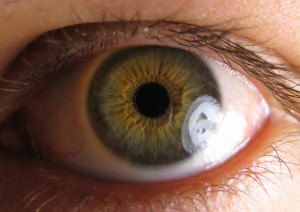
Whether you’re a full-time employee or a freelancer working from the comfort of home, it’s important to be aware of the risks of workplace eye injuries and the various safety practices you should follow. According to the American Academy of Ophthalmology, almost 25,000 people suffer eye injuries on the job that requires emergency medical attention each year. This Workplace Eye Wellness Month, please join the USC Roski Eye Institute in staying up-to-date on what you can do to protect your eyesight while you work.
The most common workplace eye injuries
While certain industries are more well known for posing greater risks to employees’ health and safety, such as construction, manufacturing, or even health care, it is necessary for people of all industries to be aware of potential dangers at work.
The most common workplace eye injuries include:
Over-Exposure to Computer Screens – With more and more people making a living from behind a computer screen, it is important to note that staring into the glowing light of a computer, laptop, or tablet can cause eye pain, eye dryness and vision issues. The level of eye strain and blurry vision will depend on the amount of exposure on a daily basis.
Small Flying Particles – Small objects, such as wood chips, metal slivers, or cement chips can cause irritation or even penetrate the delicate tissue.
Blunt Force Trauma – Large objects, including wooden beams or metal bars, can strike the socket or the eyeball, resulting in bruising, orbital injury, retinal detachment, double vision, or bleeding.
Chemical Burns – Chemical workplace eye injuries are not uncommon in the janitorial, medical, or construction industries. Ammonia, disinfectants, strong acids, and alkali substances can irritate the delicate surface of the eyes, potentially causing scarring, perforation, and blindness.
Thermal Burns – Exposure to extreme heat, such as from an oven, welding equipment, or industrial materials like molten plastics or hot gases, can penetrate the eye quickly, resulting in severe injury or total vision loss.
Radiation – Ionizing radiation from x-rays or radioisotopes, or ultraviolet radiation from tanning lamps, welding arcs, or electric sparks are the most common causes of workplace eye burn injuries. Depending on the type and amount of exposure, the damage may be gradual, developing within a few days to a year or so following exposure.
Exposure to Infectious Diseases – Nurses, doctors, and others in the medical industry face a particularly higher risk of workplace eye infections via ocular exposure to diseases. Infectious diseases and viruses can be transmitted by direct exposure to respiratory droplets or blood, as well as from touching the face or eyes with contaminated fingers.
Vision safety tips
The U.S. Occupational Safety and Health Administration (OSHA) requires that employers take appropriate measures to ensure that their employees are protected against potential workplace eye injuries. In order to help prevent workplace eye injuries, it is also important for individuals to keep the following tips in mind:
- When working at a computer, take breaks every 15 minutes to relax the eyes. Sit about 30 inches away from the screen. Try to stay well hydrated, this can help with dryness.
- Review your work space for potential hazards before starting work.
- Wear protective eyewear in areas that pose the risk of injury
- Always use appropriate protective eyewear that fits, such as goggles, safety glasses, welding helmets, full-face respirators, or face shields.
- Stay up-to-date on first aid procedures for common workplace injuries and make sure that the first aid kit is well stocked.
- Encourage coworkers and new hires to follow all safety procedures to prevent workplace eye injuries.
In the event of a workplace eye emergency it is important to take action immediately and see a doctor as soon as possible. Even seemingly minor irritants can cause significant damage over time. No matter what type of damage, remember to never rub the eye. In the event of a chemical exposure, the eye should be immediately irrigated with eyewash or water. Punctures or cuts should be covered by a rigid shield, such as a cup, while seeking medical attention. If there is a foreign body stuck in the eye, do not try to remove it prior to seeking medical advice, doing so can cause more injury.
Expert vision care at the USC Roski Eye Institute
Whether you have experienced a workplace eye injury, suspect that your work conditions are affecting your eyesight, or simply want an annual exam, the board-certified ophthalmologists at the USC Roski Eye Institute are highly experienced providing the best quality vision care and treatment available.
To make an appointment at the USC Roski Eye Institute, please call (323) 442-6335 or contact us to schedule a consultation today.
Topics
